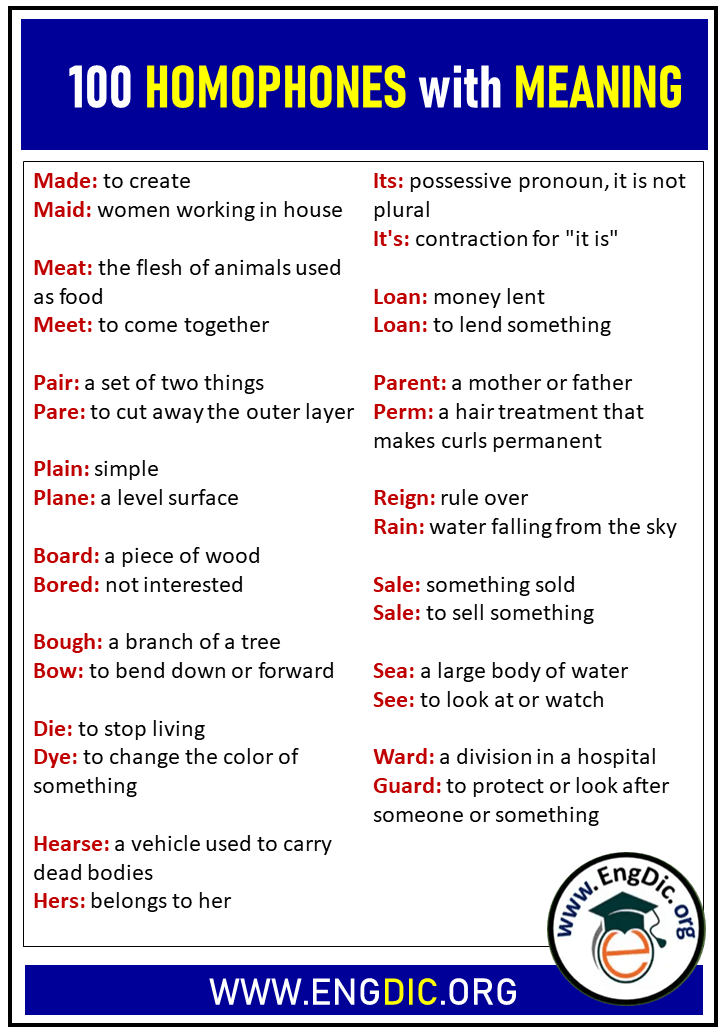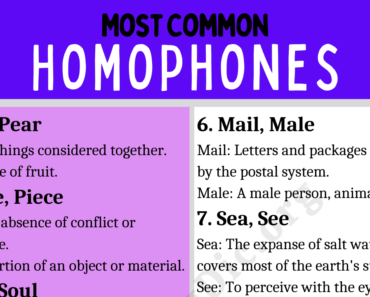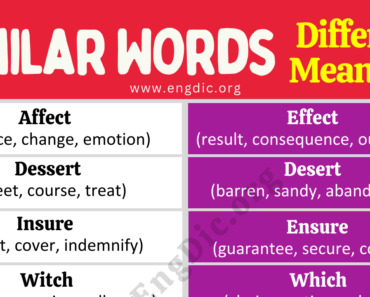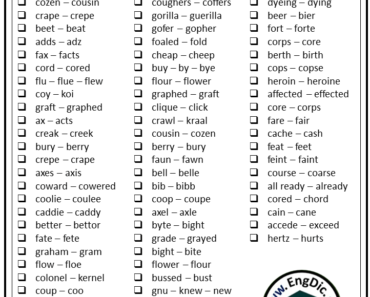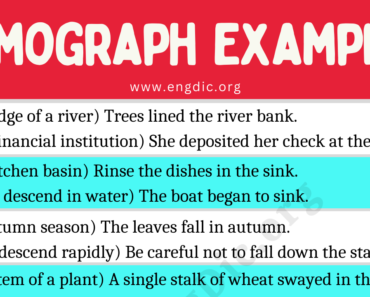Welcome to a fun and helpful lesson where we dive into the world of homophones! Homophones are words that sound the same but have different meanings and often different spellings too. They can be quite tricky, especially when you’re learning or improving your English.
This lesson will introduce you to 100 homophones, making it easier for you to understand their meanings and how to use them correctly. So, grab your notebook, and let’s make learning English exciting and enjoyable together!
Homophones with Meanings
Here is the list of 100 Homophones with Meanings:
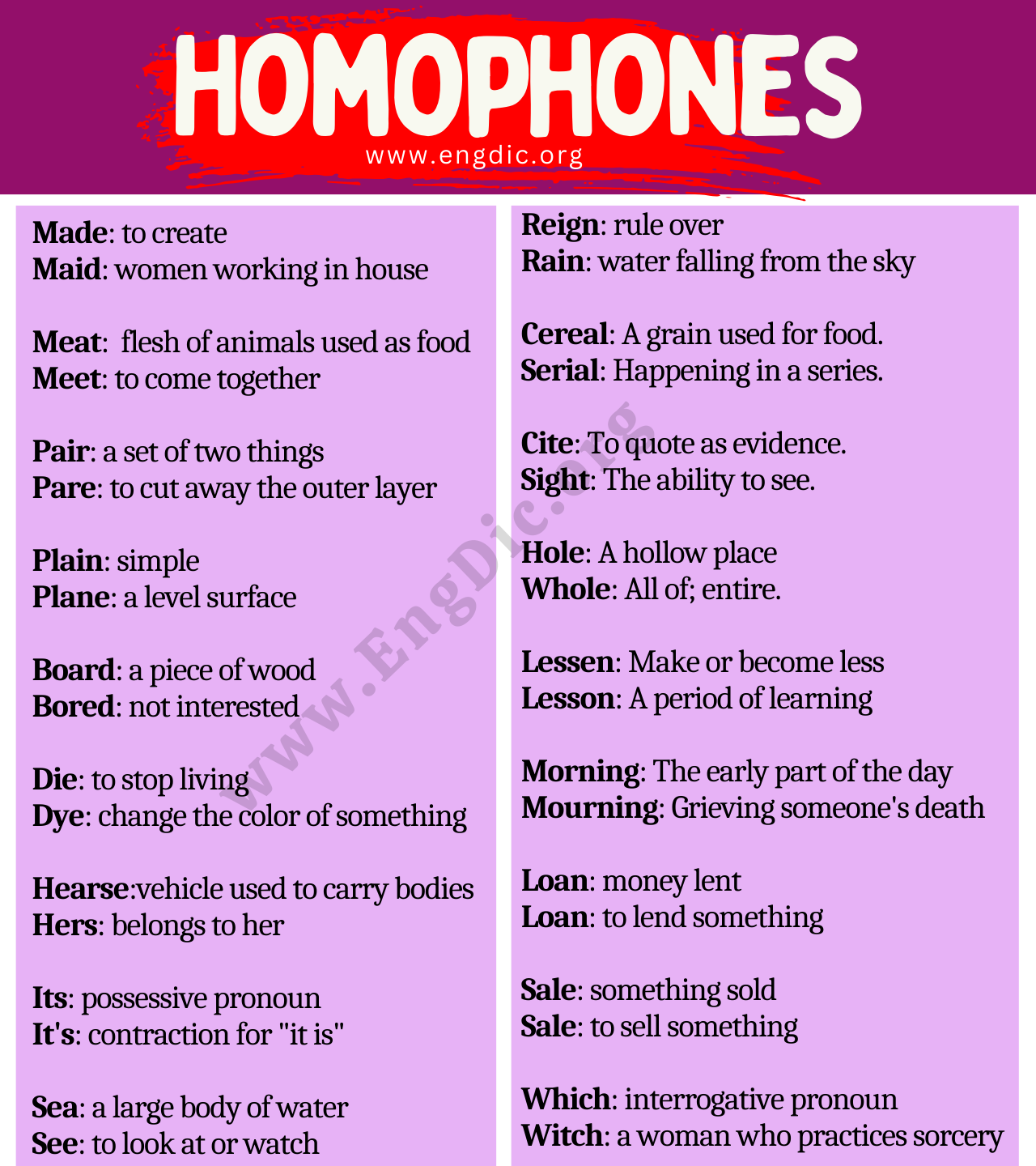
Made: to create
Maid: women working in house
Meat: the flesh of animals used as food
Meet: to come together
Pair: a set of two things
Pare: to cut away the outer layer
Plain: simple
Plane: a level surface
Board: a piece of wood
Bored: not interested
Bough: a branch of a tree
Bow: to bend down or forward
Die: to stop living
Dye: to change the color of something
Hearse: a vehicle used to carry dead bodies
Hers: belongs to her
Its: possessive pronoun, it is not plural
It’s: contraction for “it is”
Loan: money lent
Loan: to lend something
Parent: a mother or father
Perm: a hair treatment that makes curls permanent
Reign: rule over
Rain: water falling from the sky
Sale: something sold
Sale: to sell something
Sea: a large body of water
See: to look at or watch
Ward: a division in a hospital
Guard: to protect or look after someone or something
Which: interrogative pronoun
witch: a woman who practices sorcery
Your: possessive pronoun, belonging to you
You’re: contraction for “you are”
Desert: an area of land that is dry and uninhabited
Dessert: a sweet course of food served at the end of a meal
Do: to perform an action
Does: third person singular present tense verb “to do”
Ear: the organ of hearing
Ere: before, sooner than
Fair: just, equitable
Fare: the price of a journey or ride
Film: a thin sheet of plastic or other material used to cover and protect photographs
Film: to record on film
Fir: a type of tree
Fir: to give support to someone or something
Halt: stop abruptly
Halt: to make someone stop
Hear: to listen to
Here: in this place
Its: possessive pronoun, it is not plural
It’s: contraction for “it is”
Joke: a funny story or remark
Joke: to make someone laugh by telling a funny story or making a funny remark
Knows: third person singular present tense verb “to know”
Noes: rhymes with knows, alternative past tense and subjunctive form of “know”
Mare: a female horse
Mayor: the head of a city government
Ore: a type of rock that contains metal
Oar: a tool used for rowing boats
Pair: a set of two things
Pare: to cut away the outer layer
Pee: to urinate
Pee: a unit of measurement for urine output
Piece: a part of something
Peace: calm and tranquility
Plain: simple
Plane: a level surface
Principal: the most important person in a school
Principal: the head of a company or enterprise
Read: to look at and understand the meaning of written or printed words
Read: to say out loud the words of something that has been written or printed
Rear: the back part of something
Bear: to carry, support, or endure
Sale: something sold
Sale: to sell something
Sea: a large body of water
See: to look at or watch
She: the third person feminine pronoun
Her: belonging to her
Site: a place where something is or was situated
Sight: the ability to see
Aisle: A passageway between rows of seats or shelves.
Isle: A small island.
Aloud: Speaking in a voice that can be clearly heard.
Allowed: Permitted.
Altar: A sacred table in a place of worship.
Alter: To change.
Berth: A ship’s allotted place at a dock; a bed on a ship or train.
Birth: The act of being born.
Brews: Refers to drinks made by steeping, boiling, and fermenting.
Bruise: A mark on the skin caused by bleeding under the surface from an injury.
Cereal: A grain used for food, such as wheat, oats, or corn.
Serial: Happening in a series.
Chord: A combination of musical notes played together.
Cord: A thin, flexible string or rope.
Cite: To quote as evidence.
Sight: The ability to see.
Crews: Groups of people working together, often on a ship or aircraft.
Cruise: A voyage on a ship for pleasure.
Dual: Comprising two parts, elements, or aspects.
Duel: A contest between two parties.
Faint: Lacking clarity, brightness, or loudness; feeble or slight.
Feint: A deceptive or pretended move, especially in sports or military tactics.
Flea: A small, wingless, jumping insect that feeds on the blood of mammals and birds.
Flee: To run away from a place or situation of danger.
Foreword: A short introduction to a book, typically by someone other than the author.
Forward: Towards the front; in the direction that one is facing or traveling.
Gait: A person’s manner of walking.
Gate: A hinged barrier used to close an opening in a wall, fence, or hedge.
Grate: To reduce (food) to small shreds by rubbing it on a grater.
Great: Of an extent, amount, or intensity considerably above the normal or average.
Groan: A deep, inarticulate sound made in pain or despair.
Grown: Having fully developed; matured.
Heal: To become sound or healthy again.
Heel: The back part of the foot below the ankle.
Hole: A hollow place in a solid body or surface.
Whole: All of; entire.
Idle: Not active or in use; without purpose or effect; pointless.
Idol: An image or representation of a god used as an object of worship.
Knead: To work (moistened flour or clay) into dough or paste with the hands.
Need: Require (something) because it is essential or very important.
Lessen: Make or become less; diminish.
Lesson: A period of learning or teaching.
Links: Chains or connections
Lynx: A wild cat
Loan: Something borrowed
Lone: Alone, solitary
Mail: Letters and parcels delivered
Male: A male person, animal, or plant
Medal: An award for an achievement
Meddle: To interfere
Mints: Flavored candies
Minced: Chopped into small pieces
Missed: Failed to hit, reach, or contact
Mist: A fine spray or light fog
Morning: The early part of the day
Mourning: Grieving someone’s death
Muscle: A body tissue that contracts
Mussel: A type of shellfish
Naval: Pertaining to the navy
Navel: The belly button
Pail: A bucket
Pale: Light in color or complexion
Pain: Physical suffering or discomfort
Pane: A single sheet of glass in a window or door
Pair: Two things that are similar and used together
Pear: A type of fruit
Pause: A temporary stop
Paws: The feet of an animal
Peace: Freedom from disturbance
Piece: A part of something
Peak: The top of a mountain
Peek: A quick or secret look
Peer: Look keenly or with difficulty
Pier: A platform on pillars extending from shore over water
Plane: A flat surface or a flying vehicle
Plain: Simple or clear
Pole: A long, slender, rounded piece of wood or metal
Poll: A survey of public opinion
Poor: Lacking sufficient money
Pour: To flow or cause to flow
Pray: To address a deity with devotion
Prey: An animal hunted or seized for food
Profit: Financial gain
Prophet: A person regarded as an inspired teacher
Rapped: Knocked
Wrapped: Covered or enveloped
Right: Correct or a direction
Write: To mark letters, words, or symbols
Road: A wide way leading from one place to another
Rode: Past tense of ride
Role: A character played by an actor
Roll: To move by turning over and over
Root: The part of a plant that attaches it to the ground
Route: A way or course taken
Sail: To travel in a boat with sails
Sale: The exchange of a commodity for money
Scene: A place where an incident occurs
Seen: Past participle of see
Sole: The underside of a foot or shoe
Soul: The spiritual or immaterial part of a human
Some: An unspecified amount or number
Sum: The total amount resulting from the addition of two or more numbers
Stationary: Not moving
Stationery: Writing materials
Tale: A story, real or imagined
Tail: The rear part of an animal
